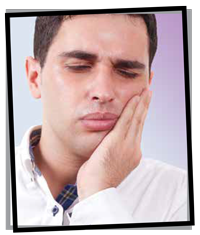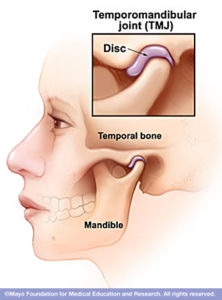TMJ/TMD Treatments
What to Do About TMD
 According to the National Institute of Dental and Craniofacial Research, approximately 5 to 12 percent of people suffer from temporomandibular joint dysfunction, more commonly known as temporomandibular disorder (TMD), which describes a variety of conditions affecting the joints, muscles, and nerves in the jaw. Learn more about the signs and symptoms associated with this painful problem.
According to the National Institute of Dental and Craniofacial Research, approximately 5 to 12 percent of people suffer from temporomandibular joint dysfunction, more commonly known as temporomandibular disorder (TMD), which describes a variety of conditions affecting the joints, muscles, and nerves in the jaw. Learn more about the signs and symptoms associated with this painful problem.
What are the temporomandibular joints?
 Located on each side of your face, the temporomandibular joints connect your lower jaw to your skull. These joints and their accompanying muscles allow you to open and close your mouth, and to move your lower jaw from side to side. You can feel these joints by placing your fingers in front of your ears and opening your mouth.
Located on each side of your face, the temporomandibular joints connect your lower jaw to your skull. These joints and their accompanying muscles allow you to open and close your mouth, and to move your lower jaw from side to side. You can feel these joints by placing your fingers in front of your ears and opening your mouth.
What is TMD?
TMD occurs when the temporomandibular joint is damaged or deteriorated, or when the muscles surrounding the joint malfunction, causing imbalanced jaw movement. The chronic muscle pain and spasms associated with this condition often can be quite painful.
What causes TMD?
In many cases, the cause of the disorder is unknown. However, TMD may be caused by trauma, such as injury or dislocation, or an improper bite, which affects the chewing muscles. Stress and its related behaviors, like clenching the jaw or grinding the teeth, may aggravate the condition. TMD appears to be more common in women than men, though there is no consensus as to why that might be.
How do I know if I have TMD?
Those with TMD may experience the following tmd symptoms on one or both sides of the face:
- Jaw pain or soreness that is more prevalent in the morning or late afternoon
- Jaw pain associated with chewing, biting, or yawning
- Clicking noises when opening and closing the mouth
- Difficulty opening and closing the mouth
- Locking or stiffness of the jaw when talking, yawning, or eating
- Tooth sensitivity not associated with dental problems
- Headaches or neck pain
- An earache not associated with an ear infection
If you experience any of these symptoms, talk to your general dentist today. He or she can perform an examination, checking the joints and muscles in your jaw for tenderness, clicking, popping, or difficulty moving. Depending on the diagnosis, your dentist may refer you to a physician or a specialist.
Is TMD permanent?
TMD is often a cyclical condition that can recur during times of stress. If you have this disorder, see your dentist for regular checkups so that he or she can monitor your symptoms and manage your care. For more information about TMD, talk to your general dentist or visit KnowYourTeeth.com.
How is TMD treated?
Many TMD cases can be handled with simple lifestyle modifications, including:
- Avoiding chewing gum and biting your nails
- Taking non-aspirin pain relievers or using heat packs to manage pain
- Eating soft foods
- Practicing relaxation or stress relief techniques
In more severe cases, your dentist may recommend physical therapy (exercises to strengthen the jaw muscles), appliance therapy (a splint, mouth guard, or bite plate),
or medication (stronger pain relievers, muscle relaxants, anti-inflammatory drugs, antidepressants, or anti-anxiety drugs).
Your Health Is Important To Us! We Want To Help!
Have You and/or Your Children Experienced These or Similar Problems?
- Chronic (Migraine) Headaches, Chronic Neck & Shoulder Pain or Stiffness
- Ringing, Buzzing or Clogged Ears
- Pain in Ears (Even Without Inflammation or Infection) or Facial Pain
- Stiffness or Locking of Your Jaw or Limited or Painful Jaw Opening
- Clicking or Grinding Noises in Your Jaw Joint
- Poor Posture, Shortness of Breath, Tingling Arms & Legs
- Frequent Broken, Crack Teeth
We offer the following TMJ services:
- Treatment for tmj and headaches, neck pain, and TMD dysfunction
- Treatment of myofascial pain
- Alignment of teeth, head and spine, obtaining neuro-muscular balance
- Correct overbite, underbite, and crossbite.

